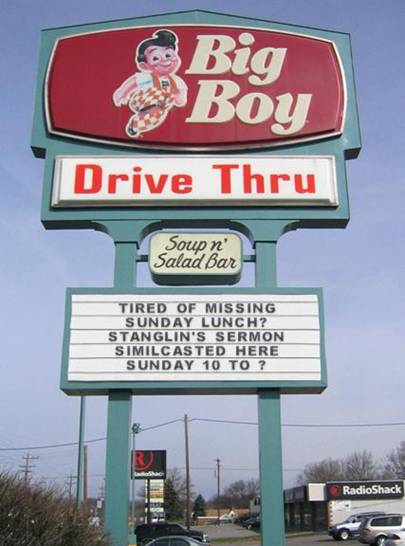 Scattershooting while wondering whatever happened to Butch Johnson and the California Quake…
Scattershooting while wondering whatever happened to Butch Johnson and the California Quake…
The “Lex Orandi Lex Credendi” post from last week was prompted by a conversation I’d had with one of our elders here at Legacy. He had read an article from another blog by another minister within our Church of Christ stream questioning our worship practices and how they do or do not match up with what we profess to believe. Our conversation centered on this man’s observation that PowerPoint probably does more harm than good in our worship assemblies. He names PowerPoint as something that, while introduced and used with noble intentions, “might form us in unhealthy or even ugly ways.”
I’ve had the chance to read the article now, and I recommend it to you. The young man’s name is Brad East. His blog is called “Resident Theology.” Here’s the link to that particularly provocative post.
It’s long been my contention that using PowerPoint in our worship assemblies actually works to destroy what our assemblies are intended by God and our Scriptures and our church leaders to do. The constantly changing slides projected on to the huge screens demand our undivided attention. We’ve stopped looking at each other. Instead, we stare at the slides.
If a congregation of a thousand were singing “Jesus Loves Me” and the words were up on the screen, we’d all — every one of us — be staring at the screen. Not because we don’t know the words to “Jesus Loves Me.” Of course we do! But because when a screen is on, we look at it. That’s what we do. We’re conditioned by our culture to look at screens. In our homes, at work, in line at Wal-Mart, driving down the road in our cars, we stare at screens. If there’s a TV up in the corner in a restaurant, you and I won’t be looking at each other. We’ll be looking at the screen. Even if we can’t hear the sound. Even if it’s an infomercial. It’s what we do.
As a preacher, I’ve noticed that I can’t make eye contact with anybody during an invitation song. Forget it. Smile at someone? Wink at somebody? Encourage someone? Acknowledge a tough time somebody may be experiencing? Impossible! No chance! Everybody’s looking at the screen!
One of the reasons (among many, I know) that nobody comes forward anymore for confession or prayer is that we’re all too busy looking at the screens. As long as the screens are on, we’re tuned out to anything that’s really happening around us. Or within us. The screens come on and our minds and bodies go into neutral. Just like they do on the couch in front of a ballgame, in a theater in front of a movie, or in line for a ride at Six Flags. Do we honestly expect anything different just because the projected words and images happen to be sacred?
But to question the use of technology and PowerPoint in our worship assemblies is taboo. To suggest a day or a month when we don’t use the screens would be heresy. Unfortunately, our churches are spending so much money on the leading technology, the constant cry is to use it more. So, with seemingly no thought to the obvious messages it sends or the ways it shapes us as a church family, we use it more.
When’s the last time you held the song book for your wife? We don’t do that anymore. When’s the last time you handed your book to a late-arriving brother or sister in front of you? There’s no need. When’s the last time you helped a young child, maybe your young child, find the number in the book? There’s a chance you’ve never done that.
I’m not saying that going back to song books is the answer. I’m not advocating that we rip all the screens out of the walls and pawn off all the projectors. I’m not saying there are not some advantages to using PowerPoint in our assemblies (I can think of one). What I beg of our preachers and worship leaders and elders is that we consider carefully why we do what we do and that we think through the long term effects of those things.
The most encouraging part of Brad’s post is that, by the looks of his picture, he’s probably not even 30-years-old. He’s young. Wow, very young! But he recognizes that something’s wrong, something’s inconsistent and disconnected between our gospel and our technology. At least he’s thinking. Not reacting. Not mindlessly following. He’s thinking.
~~~~~~~~~~~~~~~~~~~~~~~~~~~~~~~~~~~~~~~~~~~~~~~~~~~~~~~~~~~~~~~~~~~~~~~~~~~~~~~~~~~~~~
 We sent Corey and Emily Mullins off with a prayer breakfast here Monday morning. The Mullins are spending the holidays with family in East Texas and Tennessee, and then heading out to Australia as part of the first Church of Christ missionary team to go down under in 25 years. Their commitment is to preach the gospel in Australia for at least five years. They’ve only been with us here at Legacy for about six months. But we’ve all come to love them as our own. And Monday’s “goodbye” was pretty neat.
We sent Corey and Emily Mullins off with a prayer breakfast here Monday morning. The Mullins are spending the holidays with family in East Texas and Tennessee, and then heading out to Australia as part of the first Church of Christ missionary team to go down under in 25 years. Their commitment is to preach the gospel in Australia for at least five years. They’ve only been with us here at Legacy for about six months. But we’ve all come to love them as our own. And Monday’s “goodbye” was pretty neat.
We all told them how much we love them. We charged them with being strong and faithful. We reminded them that they are joining what our Father is already doing there in Wollengong, redeeming his creation, his people, back to him. And we recognized that we are joining them, too. We circled close around them, put our hands on them and our arms around them and each other and lifted them up to our Lord. We prayed for courage and faith and protection. And we committed them and their work to him. Our hearts and our prayers go with Corey and Emily as they head to Australia.
You can keep up with the Mullins by reading their blog here. I’ll also keep the link active on the right hand side of this page.
~~~~~~~~~~~~~~~~~~~~~~~~~~~~~~~~~~~~~~~~~~~~~~~~~~~~~~~~~~~~~~~~~~~~~~~~~~~~~~~~~~~~~~
Got this picture from Mark Richardson this week.
Thanks, brother. I’ll see you down front Sunday!
Peace,

Butch was actually there last Sat nite.
Thanks for adding the link to Brad’s blog. There are a slew of points we could discuss out of his post yet I’ll stay with your primary point on PP.
From the corporate world, there are times when PP is an effective tool. For the most part, it’s often over-used and too tricked up. Typically less is more when it comes to PP.
That being said, it can be effective in a worship service. I love your charge to the preachers, elders and worship leaders to consider the why. But don’t stop with the PP – take it to all areas. What about a video playing prior to worship beginning? You could use it to set the tone instead of putting up messages about what the meal will be on Wed night. Isn’t the meal already listed in the bulletin? What about a praise team on mic’s and nothing on the screens? These are not said just to fire up people (ok – maybe a little) yet rather to fully open up the discussion. Perhaps those discussions are taking place. The casual observer would say no based on the changes that have taken place.
Legacy makes some use of technology yet it doesn’t seem to me as if it’s overwhelming.
Back before people stared at screens, they stared at songbooks. As the PowerPoint minister, and as one of the people who has seen the before and after of PowerPoint, let me add some observations.
1. When people in the Church are looking up at a screen there is a noticeable lift in music energy over when people have their vocal cords compressed while looking down at a book.
2. Our older brothers and sisters who have arthritis have expressed thanks for not having to hold up the heavy songbooks.
3. If a preacher does not make eye or communication contact during a sermon ( 20 min.) how can a contact failure during a two min. song be a reason to doubt the veracity of multi-media?
4. Some people learn by audible evaluation, some by visual evaluation, and some by kinestetic evaluation. PowerPoint is a method to try to reach all regardless of learning preference. Some speakers pick their favorite method and think everyone should be just like them. A more loving method is to attempt to be sensitive to all that need to learn regardless of spiritual level or learning preference.
At least with books, there are times in every service when you know the words already and don’t use it. You’re looking at others and paying attention to others, not just yourself. With screens, everybody’s looking up all the time.
Studies are coming out now, finally, that show PowerPoint may be doing more harm than good. Putting a PowerPoint slide up on a screen causes people to tune out, to go into a trance, to disengage. Some radical groups are claiming there’s much less retention in staring at screens, not more.
To use Brad’s example, we all know every word to every verse of “Blessed Assurance.” But what about “In Christ Alone?”
Again, it’s a trade-off. Most things are. My call is for thoughtful reflection. My call is for questioning everything we do in God’s Church in terms of big-picture impact and spiritual formation. That would be the most loving thing any church leader could do.
Your first point is interesting since the greater percentage of songs we have in PowerPoint come from the books. I understand looking at each other at “one another” events during Church services, but worship is also our internal sacrifice in praise individually to God. Therefore there are times when our focus is ONLY upon God and not on “one another”, the song service being a primary example. Our singing in unity is to praise the Father. The edification of each other is a byproduct of that unity effort toward God. If the primary focus is each other then we have removed our focus from the Father.
In using Brad’s example, a comparison was made between a very old song an a relatively new one. As a previous musician, I know very well that memorized music is the best rendered. It takes a while to memorize a new song, realizing that we have a database ( in the books and in PowerPoint) of about 1200 songs.
PowerPoint , just like a songbook is just another tool to try to enhance the unity of worship. You can use it realizing that the world is shifting to a more visual basis or you can fight it, trying to insist on what the audience is shifting away from.
Please provide references as to your point about the radical groups as I would like to review what their reasoning is.
As to questioning everything ( which should include how much questioning everything should be done) let me encourage not getting into ” paralysis by analysis”. You’re the preacher. Let’s not go to a game with just our five iron.
Can the worship leader throw in his two cents? Is that alright?
Since I’ve read your post I’ve been reflecting on the first assembly we had in our new worship center. No, not the one when we packed in 1400 people and David Nelson was on the stage video taping everyone singing (great video by the way David…I love it), I’m talking about the one when all we had were walls and a roof. When we announced to the congregation that we’d raised over 200,000 dollars for missions in 2008. That night we sang old songs, new songs, children’s songs, devotional songs, and hymns – and we raised the hangin’ roof!!! There were no screens. There was no PowerPoint, but everyone sang every word of every song, not missing a beat and everyone LOVED IT!!!
Now, where was everyone looking while we sang? At the worship leader. I know that because I was the worship leader. Nobody was looking at anybody else; they were looking at me for the leadership of our worship.
I also took notice this past Sunday morning of the congregation’s attention when I was leading the worship. Yes, a lot of people were looking at the screens, but the majority still kept their eyes on me – watching for tempo changes and direction. I also took special notice during the invitation…as it was time for response and interaction. My observation was that even though there was a preacher and two or three elders down front…the majority of the congregation watched me – the worship leader. We can’t blame PowerPoint for the lack of eye contact with the preacher and elders during the invitation – can we? The congregation only does what it had been doing for the whole song service…watching the worship leader.
Technology is a slippery slope but can we really blame PowerPoint for the lack of connection? I don’t think so. I think it is years of being programmed by traditions and practices that hinder congregations from interacting with each other. Perhaps PowerPoint isn’t the vice…it’s just the scapegoat. Maybe all those years of burying your nose in a hymnal just got upgraded to fixing your eyes on the “Paperless Hymnal.” Maybe we’re scared to look at each other, or make eye contact with the preacher because we fear the vulnerability it brings. Maybe now more than ever in the history of the Church we have an epidemic of Spiritual malnourishment, and rather than (as leaders) taking ownership of fixing it, we blame the technology saying its keeping us from growing closer to one another. If that’s the case…then shame on us as leaders for not leading people to relationships with one another.
Paul didn’t write to any thousand member congregations with screens and PowerPoint. He wrote to small groups…meeting in homes that sat in a circle whre they could easily see everyone in the room. They quoted scripture and sang Psalms without looking at words….and here we are, thousands of years later complaining that screens and PowerPoint is making us less engaged. I think the point is missed when we blame the technology because it’s not the technology…it’s us. I will not connect with anyone if I wait for them to notice that I want to connect with them. I have to be willing to make it happen. I have to be willing to go against the cultural norms and give a hug, provide a wink, crack a smile, share a tough time – otherwise I’m just there…as lonely as I can be.
Allan, I appreciate you’re desire to grow this family closer to itself. I hope and pray every day that people continue to draw closer to each other and God because of our efforts as leaders. I also hope and pray every day that God will draw us all closer by his Spirit. I love you and I appreciate all you do.
I hate it when the youth minister is the one who brings us back to point. Nice.
To that point, Lance, I know Small Groups isn’t the “Easy Button” I’ve been accused of trying to make it. It doesn’t solve all of our problems in God’s Church. But, wow, anybody who participated in last night’s discussions saw and heard and experienced first-hand how connections are being made and relationships are being built and trust and faith are being strengthened. And God is glorified and Christ is exalted.
The most impactful worship I have ever been apart of was times when all the lights were off. People were free to sing without fear of being judged. I think you should try that next Sunday 😉
On a side note:
Keep pushing that button. I am convinced it is the “Easy Button.” Not that I am saying small groups are easy to pull off, manage, organize, or run. But small groups are like installing a nuclear power plant into your church. You get immediate energy but the power is lasting as people form and cement bonds that carry the group for decades. You will find no bigger fan of small groups than me for I have seen first hand their impact.
Small groups is where I found 2nd moms in Martha Duncan, Diane Vick, Lisa Sneed, and Betty Roseberry; 2nd dads in their husbands Todd, Greg, Frank, and Danny. Spiritual mentors and friends in David Watson and Greg Graves. Its where I saw adults owning their faith. Members more easily opened up about their struggles and doubts, failings and fears, and the work God was doing in their lives. I saw prayers answered.
I have not always lived the way I should. But small groups at Legacy, in addition to my parents teaching, proved vital in me returning to the way I should go.
Keep pushing that “Easy Button”!
A wonderful example of what it means for a church family to pass on the faith. And what it looks like.